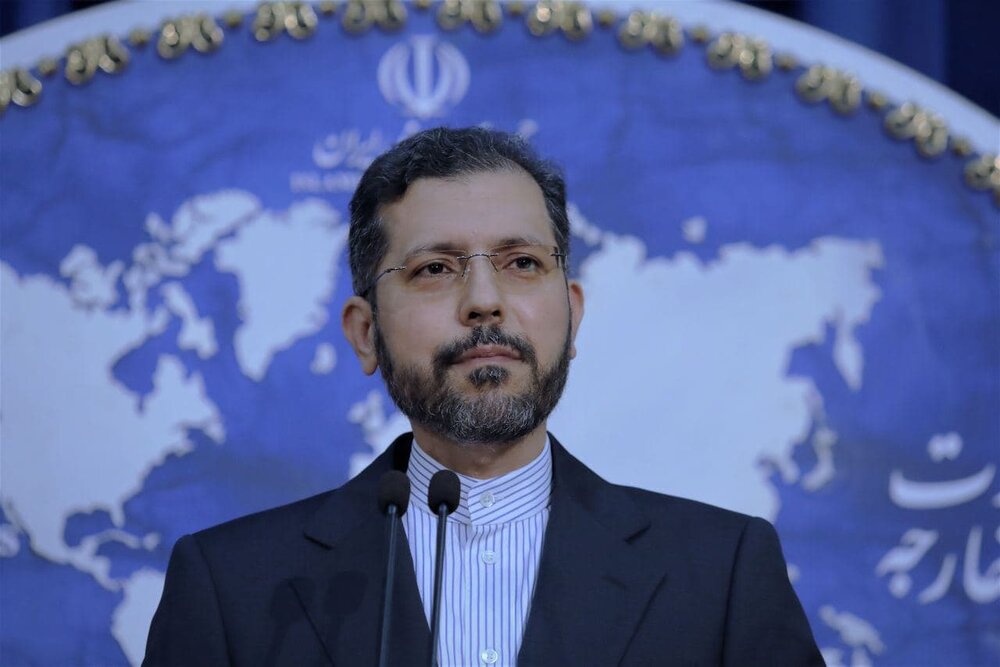Iran decries U.S. manufacturing of ‘fake news’ ahead of Vienna talks

TEHRAN – In the latest response to the United States’ reiteration of “mutual return” by Tehran and Washington to a 2015 nuclear deal between Iran and world powers, a senior Iranian official accused the U.S. of manufacturing “fake news.”
The spokesman for Iran’s Foreign Ministry, Saeed Khatibzadeh, blasted the U.S. for using the phrase “mutual return” to the Iran deal, officially known as the Joint Comprehensive Plan of Action (JCPOA). Khatibzadeh appeared to understand the U.S. use of the phrase as characterizing Iran as a party that left the JCPOA.
“The US still manufactures fake news,” he said on Twitter. “Orchestrating photo op to sell fake narrative about need for ‘mutual return to JCPOA’ doesn't change reality that, unlike the U.S., Iran never left the deal.”
He added, “Spin won't get the US anywhere. Wise decisions—like ending max failure—just may.”
The tweet seems to be in a response to a recent tweet by the U.S. envoy for Iran, Rob Malley, who called for a “mutual return” to the JCPOA.
“Met with the E3 political directors and senior officials from Egypt, Jordan, and the GCC to discuss 2 paths open to Iran: continued nuclear escalation & crisis, or mutual return to the JCPOA, creating opportunities for regional economic & diplomatic ties. Time to choose is short,” Malley said on Twitter.
This tweet also elicited a response from former Iranian Foreign Minister Mohammad Javad Zarif.
Zarif said the U.S. envoy is trying to rewrite the recent history of the nuclear deal, officially known as the Joint Comprehensive Plan of Action (JCPOA).
“@USEnvoyIran is exploiting the change of administration in Iran & ‘memory lapse’ of E3/EU to rewrite recent history. Iran never left to do a ‘mutual return to JCPOA.’ The US did,” Zarif said on Twitter.
The former top Iranian diplomat was responding to a recent tweet by Malley in which he called for mutual return by Tehran and Washington to the JCPOA.
However, Zarif suggested that Iran is still honoring its commitments under the nuclear deal while the U.S. and the European signatories to it have failed to implement the deal.
Iran and the P4+1 group of countries - Russia, China, France, and the UK plus Germany – will gather again in Vienna later this month to resume the Vienna talks after a five-month hiatus.
The much-awaited talks, scheduled to be held on November 29, will center around discussing ways to lift U.S. sanctions on Iran. The last round of talks was concluded on June 20 and it was held at Vienna’s five-star luxury Grand Hotel. Ever since the talks have been put on hold due to the transition of power in the wake of Iran’s June presidential election which resulted in the victory of Ayatollah Seyed Ebrahim Raisi.
Over the past five months, there has been much pressure from the West on Iran to return to Vienna. After completing the transition process, Iran finally announced November 29 as the date for resuming the Vienna talks.
With Iran and the West going into the talks in a few days, International Atomic Energy Agency (IAEA) director-general Rafael Grossi paid a visit to Tehran on Monday for talks with the Atomic Energy Organization of Iran (AEOI) chief Mohammad Eslami and Iranian Foreign Minister Hossein Amir Abdollahian.
“The whole issue between Iran and the Agency (IAEA) is a technical one, and the Agency will not take into account or be influenced by the political issues and conspiracy theories of Iran's enemies in Iran's advancing nuclear program,” Eslami said in a joint press conference with Grossi.
